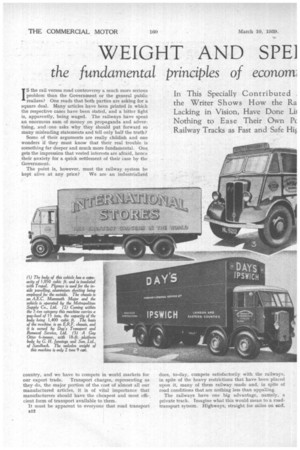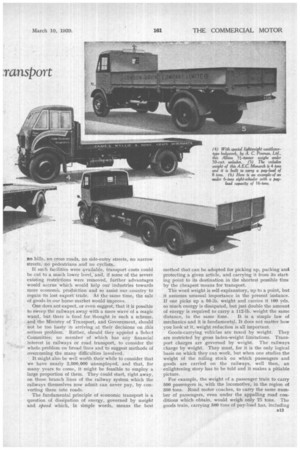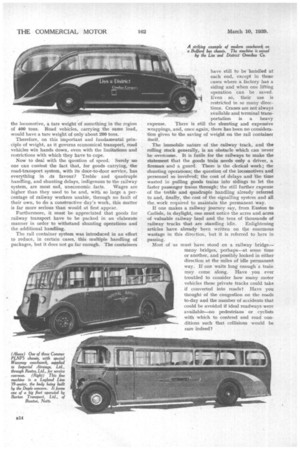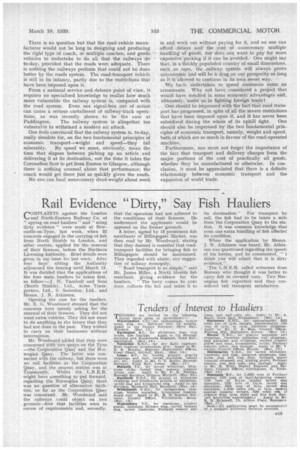WEIGHT AND SPE]
Page 46

Page 47

Page 48

Page 49

If you've noticed an error in this article please click here to report it so we can fix it.
the fundamental principles of econom; ransport
In This Specially Contributed . the Writer• Shows How the Ra Lacking in Vision, Have Done Lii Nothing to Ease Their Own Pc Railway Tracks as Fast and Safe Hig IS the rail versus road controversy a much more serious problem than the Government or the general public realizes? One reads that both parties are asking for a square deal. Many articles have been printed in which the respective cases have been stated, and a bitter fight is, apparently, being waged. The railways have spent an enormous sum of money on propaganda and advertising, and one asks why they should put forward so many misleading statements and tell only half the truth?
Some of their arguments are really childish and one wonders if they must know that their real trouble is something far deeper and much more fundamental_ One gets the impression that vested interests are afraid, hence • their anxiety for a quick settlement of their case by the Government. The point is, however, must the railway system be kept alive at any price? We are an industrialized country, and we have to compete in world markets for our export trade. Transport charges, representing as they do, the major portion of the cost of almost all our manufactured articles, it is of vital importance that manufacturers should have the cheapest and most efficient form of transport available to them.
It must be apparent to everyone that road transport B12 does, to-day, compete satisfactorily with the railways, in spite of the heavy restrictions that have been placed upon it, many of them railway made and, in spite of road conditions that are nothing less than appalling.
The railways have one big advantage, namely, a private track. Imagine what this would mean to a roadtransport sytsem. Highways, straight for miles on end, no hills, no cross roads, no side-entry streets, no narrow streets, no pedestrians and no cyclists.
If such facilities were available, transport costs could he cut to a much lower level, and, if some of the severe existing restrictions were removed, further advantages would accrue which would help our industries towards more economic production and so assist our country to regain its lost export trade. At the same time, the sale of goods in our home market would improve.
One does not expect, or even suggest, that it is possible to sweep the railways away with a mere wave of a magic wand, but there is food for thought in such a scheme, and the Ministry of Transport, and Government, should not be too hasty in arriving at their decisions on this serious problem. Rather, should they appoint a Select Committee, no member of which has any financial interest in railways or road transport, to consider the whole problem on broad lines and to suggest methods of overcoming the many difficulties involved.
It might also be well worth their while to consider that we have nearly 2,000,000 unemployed, and that, for many years to come, it might be feasible to employ a large proportion of them. They could start, right away, on those branch lines of the railway system which the railways themselves now admit can never pay, by converting them into roads.
The fundamental principle of economic transport is a question of dissipation of energy, governed by weight and speed which, in simple words, means the best
method that can be adopted for picking up, packing and protecting a given article, and carrying it from its starting point to its destination in the shortest possible time by the cheapest means for transport.
The word weight is self-explanatory, up to a point, but it assumes unusual importance in the present instance. If one picks up a 56-1b weight and carries it 100 yds. so much energy is dissipated, but just double the amount of energy is required to carry a 112-1b. weight the same distance, in the same time. It is a simple law of mechanics and it is fundamental. It does not matter how you look at it, weight reduction is all important.
Goods-carrying vehicles are taxed by weight. They are restricted by gross laden-weight limitations. Transport charges are governed by weight. The railways charge by weight. They must, for it is the only logical basis on which they can work, but when one studies the weight of the rolling stock on which passengers and goods are carried on the railways, well then, an • enlightening story has to be told and it makes a pitiable picture.
For example, the weight of a passenger train to carry 500 passengers is, with the locomotive, in the region of 350 tons. Road motor coaches, to carry the same number of passengers, even under the appalling road conditions which obtain, would weigh only 75 tons. The goods train, carrying 500 tons of pay-load has, including the locomotive, a tare weight of something in the region of 400 tons. Road vehicles, carrying the same load, would have a tare weight Of only about 200 tons.
Therefore, on this important and fundamental principle of weight, as it governs economical transport, road vehicles win hands down, even with the limitations and restrictions with which they have to cope.
Now to deal with the question of speed. Surely no one can contest the fact that, for goods • carrying, the road-transport system, with its door-to-door service, has everything in ,ts favour? Treble and quadruple handling, and shunting delays, indigencius to the railway system, are most sad, uneconomic facts. Wages are higher than they used to be and, with so large a per • centage of railway workers unable, through no fault of their own, to do a constructive day's work, this matter is far more serious than would at first appear.
Furthermore, it must be appreciated that goods for railway transport have to be .packed in an elaborate manner in order to withstand shunting operations and the additional handling_ The rail container system was introduced in an effort to reduce, in certain cases, this multiple handling of packages, but it does not go far enough. The containers have still to be handled at each end, except in those cases where a factory has a siding and when one lifting operation can be saved. Even so, their use is restricted in so many directions. Cranes are not always available and terminal transportation is a heavy
expense. There is still the shunting and expensive wrappings, and, once again., there has been no consideration given to the saving of weight on the rail container itself.
The immobile nature of the railway track, and the rolling stock generally, is an obstacle which can never be overcome. It is futile for the railways to make the statement that the goods train needs only a driver, a fireman and a guard. There is the clerical work ; the shunting operations; the question of the locomotives and personnel so involved; the cost Of delays and the time wasted in pulling goods trains into sidings to let the faster passenger trains through; the still further expense of the treble and quadruple handling already referred to and, finally, the cost of the signalling system and all the, work required to maintain the permanent way.
If one makes a railway journey say, from Euston to Carlisle, in daylight, one must notice the acres and acres of valuable railway land and the tens of thousands of railway trucks that are standing idle. Enlightening articles have already been written on the enormous wastage in this direction, but it is referred to here in passing.
Most of us must have stood on a railway bridge— many bridges, perhaps—at some time or another, and possibly looked in either direction at the miles of idle permanent way. If one waits long enough a train may come along. Have you ever troubled to consider how many motor vehicles these private tracks could take if converted into roads? Have you thought of the congestion on the roads to-day and the number of accidents that could be avoided if ideal roadways were available—no pedestrians or cyclists with which to contend and road conditions such that collisions would be rare indeed? There is no question but that the road-vehicle manufacturer would not.be long in designing and producing the right type of coach, Or multiple coaches, and goods • vehicles to undertake to do all that the railways do • to-day, provided that the roads were adequate. There is nothing the railways perform that could not be done better by the roads system. The road-transport vehicle is still in its infancy, partly due to the nstrictions' that have been imposed upon it.
From a national service and defence point of view, it requires no specialized knowledge to realize how much more vulnerable the railway system is, compared with the road system. Even one signal-box out of action can cause a serious curtailment of railway-track operations, as was recently shown to be the case at Paddington. The railway system is altogether too vulnerable to withstand a modern air attack.
One feels convinced that the railway system is, to-day, really obsolete for, on the two fundamental principles of economic transport—weight and speed—they fail miserably. By speed we must, obviously, mean the time that elapses between picking up an article and delivering it at its destination, not the time it takes the Coronation Scot to get from Euston to Glasgow, although there is nothing unusual about that performance; the coach would get there just as quickly given the roads.
No one can haul unnecessary dead-weight about week
in and week out without paying for it, and no one can afford delays and "the cost of unnecessary multiple handling of goods, tickdoes one want to pay for more expensive packing if it can be avoided. One Might say that, in a thickly populated country of small dimensions, such as ours, the railway system will always prove uneconomic and will be A dragon our prosperity so long as it is allowed to continue in its own sweet way.
We have Undertaken to spend enormous sums on armaments. Why not have considered a project that would have resulted in some economic advantages and ultimately,assist us in fighting foreign trade?
One should be in-Tressed with the fact that road transport has progressed, in spite of all the severe restrictions that have been imposed upon it, and it has never been
subsidized during the whole of its uphill fight. One should also be impressed by the two fundamental principles of economic transport, namely, weight and speed, both of which are so much in favour of the road-operated machine.
Furthermore, one must not forget the importance of the fact that transport and delivery charges form the major portions of the cost of practically all goods, whether they be manufactured or otherwise. In con • elusion, it must be appreciated. that there is a definite relationship between economic transport and the expansion of world trade.




























































































